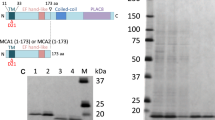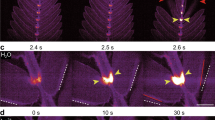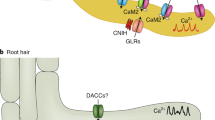Abstract
IN an article in NATURE of October 25 Prof. Dixon1 has reviewed an investigation of conduction in Mimosa pudica which I lately carried out in Trinidad.2 He agrees with my conclusion that “normal” conduction in the stem has been correctly explained by Dr. Ricca as depending on a stimulant moving with the transpiration current in the wood, but disagrees in that he inclines to consider that Dr. Ricca's explanation is adequate to cover all the phenomena of conduction in Mimosa, including conduction in the leaf and the subordinate phenomenon of “high-speed” conduction in the stem. He offers no positive evidence tending to support this view, but criticises the evidence from which I have concluded that Dr. Ricca's explanation will not cover the whole ground.
This is a preview of subscription content, access via your institution
Access options
Subscribe to this journal
Receive 51 print issues and online access
$199.00 per year
only $3.90 per issue
Buy this article
- Purchase on Springer Link
- Instant access to full article PDF
Prices may be subject to local taxes which are calculated during checkout
Similar content being viewed by others
References
Dixon, H. H., NATURE, vol. 136, p. 626, October 25, 1924.
Snow, R., Proc. R.S., B, vol. 96, p. 349, 1924.
Herbert, D. A., The Philippine Agriculturist, vol. 11, No. 5, 1922.
Böde, H. R., Jahrb. f. wiss. Bot., vol. 62, 1923.
Author information
Authors and Affiliations
Rights and permissions
About this article
Cite this article
SNOW, R. Transmission of Stimuli in Plants. Nature 115, 82–83 (1925). https://doi.org/10.1038/115082a0
Issue Date:
DOI: https://doi.org/10.1038/115082a0
Comments
By submitting a comment you agree to abide by our Terms and Community Guidelines. If you find something abusive or that does not comply with our terms or guidelines please flag it as inappropriate.



